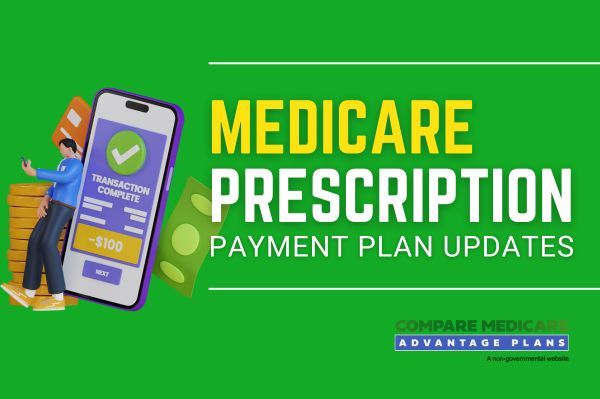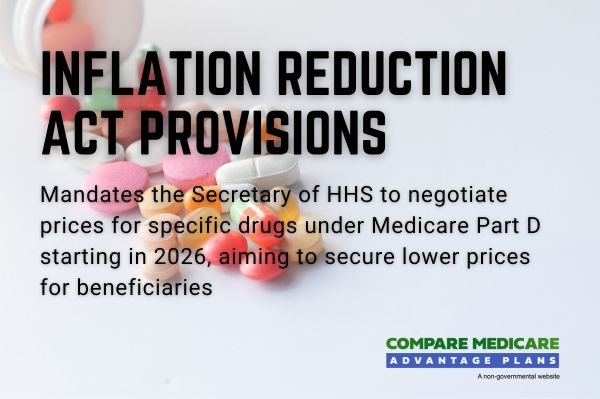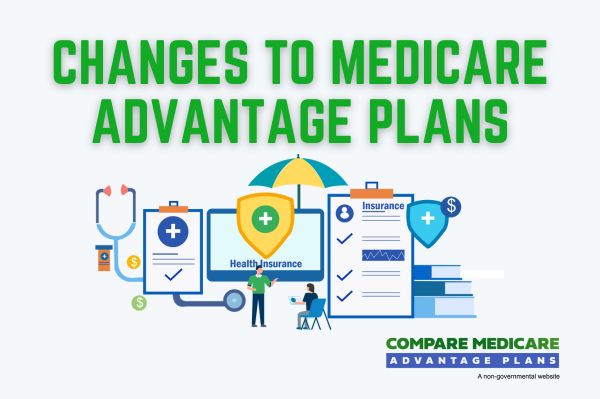




Changes to Medicare in 2026
In 2026, Medicare might undergo several changes that could affect coverage and costs, which may include potential CHANGES TO MEDICARE IN 2026. There may be potential updates to prescription payment plans, out-of-pocket drug cost caps, and the insulin price cap. Read on for a detailed overview.
Key Takeaways
- Starting in 2026, Medicare might implement automatic renewal for prescription drug plans, which could potentially simplify enrollment and possibly reduce the need for re-enrollment, while likely allowing beneficiaries to opt out for alternative coverage.
- A new out-of-pocket cap for Medicare Part D drugs may also be introduced in 2026, possibly easing financial burdens and improving budget management for beneficiaries with high prescription needs.
- Medicare may also cap insulin costs, possibly providing immediate financial relief for diabetes management and part of a broader effort to make essential medications more affordable.
Compare Plans in One Step!
Enter Zip Code
Medicare Prescription Payment Plan Updates

Beginning in 2026, the Medicare Prescription Payment Plan could potentially simplify the enrollment process. These plans might include updates on the automatic renewal feature, which could help keep beneficiaries enrolled in their prescription drug plans unless they opt out. This potential change will likely be designed to provide continuous coverage without the hassle of re-enrollment each year, possibly making it easier for beneficiaries to maintain their prescription drug coverage and avoid lapses in prescription drug programs.
Despite the convenience of automatic renewal, beneficiaries may also opt out to explore other plans or adjust to changing healthcare needs. This flexibility could help tailor prescription drug coverage to individual situations, possibly reducing worries about enrollment deadlines and may allow more focus on health and well-being.
Automatic renewal could potentially reduce the administrative burden on beneficiaries and families. However, it’s still essential to review one’s prescription drug plan annually to ensure it could continue to meet one’s current needs.
This potential update will likely aim to make the Medicare Prescription Payment Plan more user-friendly and accessible, benefiting millions of Americans.
Cap on Out-of-Pocket Prescription Drug Costs
Medicare Part D might implement a new cap on out-of-pocket prescription drug costs. Once this cap is reached, beneficiaries might not have to pay for covered medications, possibly easing the financial burden for those with high prescription drug needs.
This potential out-of-pocket cap could make prescription drug costs more manageable. The possible option to spread expenses through monthly payments might help beneficiaries budget healthcare expenses more effectively, potentially avoid large lump-sum payments and may even help reduce financial strain.
These potential cap and monthly payment options might reduce financial barriers for Medicare beneficiaries, likely providing more predictable and manageable prescription drug costs. This will likely allow beneficiaries to focus more on their health than their finances.
Insulin Cost Cap Implementation
In 2026, Medicare might cap insulin costs for a covered insulin product. This potential change could provide financial relief for those managing diabetes and will likely apply to all covered insulin products under Medicare Part D.
This potential insulin cost cap might exclude deductibles, likely ensuring immediate and accessible savings. This could make a significant difference for those needing regular insulin.
This cap may also be part of a broader effort to make essential medications more affordable. By potentially offering a cap on insulin costs, Medicare could help beneficiaries manage their health without prohibitive expenses.
Free Adult Vaccines Under Medicare Part D

Another potential update under Medicare Part D could be the provision of free adult vaccines. This policy will likely reduce cost-sharing and deductibles for recommended adult vaccines, possibly ensuring access to essential immunizations without financial barriers, especially for older adults and those with chronic conditions.
This policy, guided by the Advisory Committee on Immunization Practices (ACIP), likely ensures beneficiaries receive the latest and most effective immunizations at no cost. From flu shots to shingles vaccines, this potential update could promote preventive care and potentially reduce serious illnesses among Medicare beneficiaries.
Medicare Part D insurers must comply with this policy, waiving deductibles and applicable cost sharing for ACIP-recommended vaccines as part D programs. This might increase vaccine accessibility and will likely encourage higher vaccination rates, improving the overall health of the Medicare population.
Providing free vaccines could be an investment in preventive care, possibly leading to healthier outcomes and lower long-term healthcare costs.
Inflation Reduction Act Provisions

The Inflation Reduction Act (IRA) will likely mandate the Secretary of HHS to negotiate prices for specific drugs under Medicare Part D. Initially, prices for Part D drugs might be negotiated, possibly aiming to secure lower prices for beneficiaries. This could potentially lead to substantial savings.
The negotiation process may expand in following years. This negotiated price will likely take effect on January 1, 2027, possibly providing more affordable medications and may reflect a commitment to making prescription drug prices more accessible for all Medicare beneficiaries.
The IRA may also introduce the Manufacturer Discount Program, which might replace the Coverage Gap Discount Program/ This potential transition could streamline the discount process and possibly ensure continued cost savings on medications for beneficiaries.
Public opinion will likely support these measures, with some advocating for the program’s expansion to include more drugs and broader coverage.
Potential Changes to Medicare Advantage Plans

In 2026, Medicare Advantage plans may undergo several changes, which may regard Special Supplemental Benefits for Chronically Ill (SSBCI). The final rule could potentially restrict benefits to exclude items like life insurance and unhealthy food options, possilby ensuring the focus remains on health-related support for chronically ill patients in a Medicare Advantage plan.
Restrictions also may also apply to certain benefits like tobacco and alcohol, which are excluded under SSBCI regulations. These potential changes could streamline benefits under some Medicare Advantage plans, possibly ensuring these plans could be truly beneficial for beneficiaries’ health by excluding non-health-related items.
Dual Eligible Special Needs Plans (D-SNPs) might implement integrated ID cards for Medicare and Medicaid, possibly simplifying the process for beneficiaries. Some plans may also conduct a unified health risk assessment, which might replace separate assessments, to improve care coordination and possibly ensure comprehensive support.
Potential Adjustments to Risk Adjustment Models
In 2026, the Centers for Medicare & Medicaid Services (CMS) may finalize separate normalization factors for the Part D final rule risk adjustment models. These potential updates could help plan sponsors provide more accurate bid estimates and reflect a commitment to improving the accuracy of risk scores, which will likely determine payments and resource allocation for beneficiaries.
The updated risk adjustment model may also incorporate new coefficients that might affect risk scores, accurately reflecting beneficiaries’ health status and needs.
In CY, risk scores will likely be calculated using a mixed method that blends data from diagnoses and claims from recent years. This could potentially provide a comprehensive and accurate assessment of beneficiaries’ risk score health or overall function needs, possibly leading to better resource allocation and improved care outcomes.
The possibility of refining the risk adjustment models, the technical adjustment cms proposed enhancements may help improve the overall efficiency and effectiveness of the Medicare program.
Annual Review of Medicare Plans
Annual review of Medicare plans will likely be crucial to ensure coverage meets beneficiaries’ needs. Coverage details and health situations might change each year, requiring an evaluation and adjustment of ma plans. Neglecting this review could potentially lead to costly mistakes over time, which could impact finances.
Despite the importance of annual reviews, some Medicare beneficiaries may fail to evaluate their plans each year, possibly missing opportunities for better coverage. This oversight might lead to higher out-of-pocket costs and suboptimal coverage. State Health Insurance Assistance Programs (SHIP) provide free, unbiased support to help beneficiaries navigate Medicare complexities and select the best MA organization plans.
During the Annual Open Enrollment Period, beneficiaries can switch plans or adjust coverage based on changing needs for ma enrollees. This period will likely be critical for making necessary adjustments to ensure comprehensive and cost-effective healthcare coverage. Members should utilize available resources and conduct annual reviews, which could help maximize Medicare benefits and potentially avoid unnecessary expenses.
Summary
The potential changes to Medicare in 2026 will likely represent potential advancements in coverage and cost management for beneficiaries. From the potential introduction of caps on certain prescription drug costs to the possible implementation of free adult vaccines, these updates will likely be designed to make healthcare more affordable and accessible. The Inflation Reduction Act provision might further enhance these benefits by potentially offering substantial savings for beneficiaries. As these potential changes occur, Medicare beneficiaries should stay informed and proactive in managing their healthcare coverage. Annual reviews of Medicare plans could help beneficiaries maximize their benefits and receive the best possible care. By understanding and taking advantage of these potential updates, beneficiaries could navigate the evolving landscape of Medicare with confidence and ease.
Frequently Asked Questions
→ What is the potential cost cap for insulin for Medicare beneficiaries starting in 2026?
Unfortunatley, the plan details for 2026 have not been released, but make sure to check back in to this article/website for updated information for the 2026 calendar year.
→ What is the requirement for Medicare Part D insurers regarding adult vaccines from 2026 onward?
Medicare Part D insurers might need to waive deductibles and cost-sharing for adult vaccines recommended by the Advisory Committee on Immunization Practices (ACIP). This potential change might improve access to essential vaccinations for beneficiaries.
→ How often should Medicare beneficiaries review their plans?
Medicare beneficiaries should review their plans annually during the Annual Open Enrollment Period, which provides an opportunity to switch plans or adjust coverage according to their needs.
→ What changes might be being made to Medicare Advantage plans in 2026 regarding supplemental benefits?
In 2026, some Medicare Advantage plans may restrict special supplemental benefits, which might disallow coverage for items such as life insurance and unhealthy food options under the Special Supplemental Benefits for Chronically Ill (SSBCI). This potential change might streamline the benefits provided to ensure they are more aligned with health improvement goals.

ZRN Health & Financial Services, LLC, a Texas limited liability company


